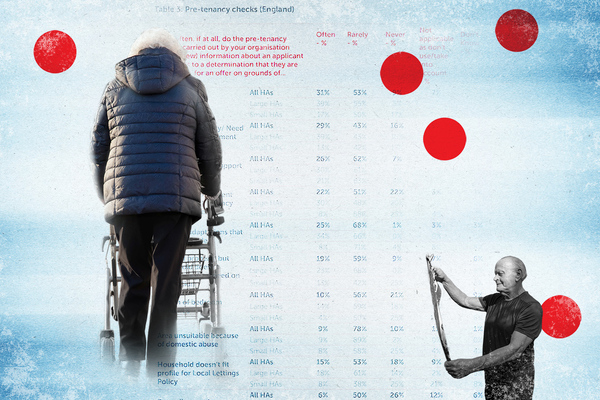You are viewing 1 of your 1 free articles
Notting Hill Genesis ‘scales back’ development plans amid changing market conditions
Large London housing association Notting Hill Genesis (NHG) has been forced to “significantly scale back” its development plans as a result of “changing market conditions”, the Regulator of Social Housing has said.
In its latest regulatory judgement for the 66,000-home landlord, the English regulator said the organisation had initially intended to increase its development programme to 2,700 homes a year but now intends to “scale that number back significantly”.
The news from the regulator comes after Inside Housing revealed in February that the association had more than 400 unsold units on its books. It is one of a number of large developing housing associations that have found it hard to sell private sale homes as the London housing market slows.
The regulatory judgement said the decision to scale back development by NHG “is expected to lead to forecast improvements in the interest cover from its core social housing lettings”.
The landlord, which has homes in London, the Home Counties and East Anglia, kept its ‘G1 V2’ grading following an in-depth assessment but had the basis for its viability rating changed.
The regulator concluded that NHG, formed through a merger between Notting Hill Housing and Genesis Housing Association last April, “has an adequately funded business plan” but “faces a range of risks and exposure to sales”.
It warned the association “needs to manage the material risks relating to its sales performance, the scale and complexity of its regeneration activity and high levels of associated on-lending to subsidiaries within the group”. Within the NHG group there are 41 unregistered legal entities, including nine joint venture partnerships and five special purpose vehicles.
The regulator added in its judgement that it had “assurances that NHG’s governance arrangements enable it to adequately control the organisation and to continue meeting its objectives”.
Kate Davies, chief executive at Notting Hill Genesis, said: “Given the difficult circumstances of integrating two large organisations alongside a challenging economic and political environment, we are very proud of this result.
"We still have things to work on, of course, and we will take the feedback from the regulators on board completely. While we are rightly pleased to have maintained this rating, we are determined to improve on this in future.
“Notting Hill Genesis remains a strong, robust organisation with the financial clout, influence, skills and resources to build more of the homes so desperately needed across London and the South East. We are glad the regulator recognises we have the financial and governance resources to meet our aspirations.”
Inside Housing has asked Notting Hill Genesis for more information with regards to its development plans and latest accounts.
Commenting on the scaling back of development, a Notting Hill Genesis spokesperson said: “Across the housing sector there has been a downturn in sales in the last financial year as a result of challenging economic and political conditions. The lack of clarity around Brexit is having a profound effect on the sales market in particular with people unsure about whether to buy at this stage, wondering what will happen to house prices and questioning whether interest rates will rise.
"These decisions are even harder for people for whom affordable housing is the only option to get on the housing ladder.
“In light of these factors, and as a financially prudent organisation, we are watching our position carefully and are taking a pragmatic approach to future capital spend, especially on sales-related products.
"As part of this, we’ve reviewed our development programme and agreed to ease up slightly for now. In the short-term, we’ll be concentrating on existing projects, rather than adding to the pipeline – but our cash flow situation is sufficiently liquid that we can increase commitments again quickly and take advantage of any opportunities that might arise.”
Regulatory judgements published on 31 July 2019
| Provider | Governance | Viability | Explanation |
|---|---|---|---|
| Brent Community Housing | N/A | N/A | Economic standards - non-compliant |
| Bromsgrove District Housing Trust | G1 | V1 | No change |
| Jigsaw Homes Group | G1 | V1 | No change |
| LiveWest Homes | G1 | V1 | No change |
| Notting Hill Genesis | G1 | V2 | No change - but changed basis for viability rating |
| Toddington United Almshouse Charity | N/A | N/A | Economic standards - non-compliant |
| Wrott and Hill Charity | N/A | N/A | Economic standards - non-compliant |
| Wythenshawe Community Housing Group | G1 | V1 | No change |
Future of Work Festival
New for 2019, Inside Housing’s Future of Work Festival will bring together HR and organisational development professionals from the housing sector to discuss and explore the challenges of how to successfully evolve towards the working environment of the future.
Seize this opportunity to rethink your workforces and workplaces by reconsidering the roles of individuals, organisations, automation technology and how society will approach work.
Assess and benchmark your business strategy with the leaders in the housing sector:
- Defining the Future of Work: what does it look like, what will be the implications, how do you rethink your workforce strategy?
- How to embed Electronic Data Interchange into your workforce, attract the widest pool of talent, be authentic and innovative, keep your workforce happy and productive, and position your brand
- Identifying, assessing and closing the skill gaps: what skills will be required in the future and how do you prepare for the undefined?
- Appealing to and maintaining a multi-generational workforce: how to address differing career aspirations, expectations, behaviours and values
- How best to implement the best tech, for example, big data, artificial intelligence, automation, blockchain and the Internet of Things. How will this change workplace skills and wages? How do you evolve towards a ‘STEMpathetic’ workforce?
- Providing your HR and OD department with the right skills and toolkits to revise talent, organisational structures and business models. Be social and environmentally friendly, and data driven – investing in disruptive tech, skills training and ethical use of tech
- Promoting well-being and employee experience
- Introducing training and learning as part of the career path
- Embracing agile working – understanding how flexible and alternative working arrangements can boost productivity
The festival will take place on 17 September, at Westminster Bridge, County Hall in London.
Related stories










